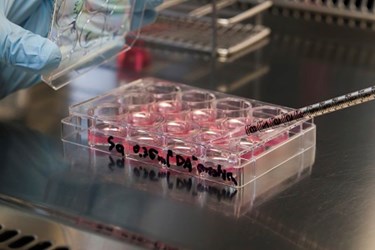Researchers Discover Breakthrough Stem Cell Treatment For Parkinson's Disease
By C. Rajan, contributing writer

Researchers at Lund University in Sweden have made a major breakthrough in Parkinson's disease treatment by developing stem cell-derived brain cells that can replace the cells lost due to the disease, thus paving the way for the first stem cell transplant treatment for Parkinson’s patients.
Parkinson's disease, which affects about 10 million people worldwide, is a degenerative nervous system condition which causes tremors, muscle weakness, stiffness, and loss in mobility. Parkinson's is caused by loss of dopamine-producing neurons in the brain. Dopamine is an essential neurotransmitter that is required for regulating movement and emotions.
In this study, for the first time ever, the researchers were able to convert human embryonic stem cells into dopamine producing neurons, which behaved like native dopamine cells lost in the disease.
The study was led by Malin Parmar, associate professor in Lund's Department of Medicine, and conducted at both Lund University and at MIRCen in Paris as part of the EU networks NeuroStemCell and NeuroStemcellRepair.
According to Medical News Today, the researchers produced rat models of Parkinson's disease by destroying the dopamine cells in one part of the rat's brain, and then they transplanted the new dopamine producing stem cell neurons. These next generation dopamine neurons were found to survive long term, restore the lost dopamine, and form long distance connections to the correct parts of the brain when transplanted into rats. Most excitingly, these transplanted stem cells reversed the damage from the disease.
As the new dopamine neurons have the same properties and functions of native cells lost in Parkinson's disease and can be produced in unlimited quantities from stem cell lines, this treatment shows promise in moving into clinical applications as stem cell transplants for Parkinson’s.
"This study shows that we can now produce fully functioning dopamine neurons from stem cells. These cells have the same ability as the brain’s normal dopamine cells to not only reach but also to connect to their target area over longer distances. This has been our goal for some time, and the next step is to produce the same cells under the necessary regulations for human use. Our hope is that they are ready for clinical studies in about three years", says Malin Parmar.
Human embryonic stem cells (ESC) are powerful treatment options due to their ability to change into any cell type in the body. However, it is difficult to get them to change into the desired cell types, and research efforts are also hampered due to the ethical concerns associated with embryonic stem cells.
The study is published in the journal, Cell Stem Cell, titled “Human ESC-Derived Dopamine Neurons Show Similar Preclinical Efficacy and Potency to Fetal Neurons when Grafted in a Rat Model of Parkinson’s Disease.”
